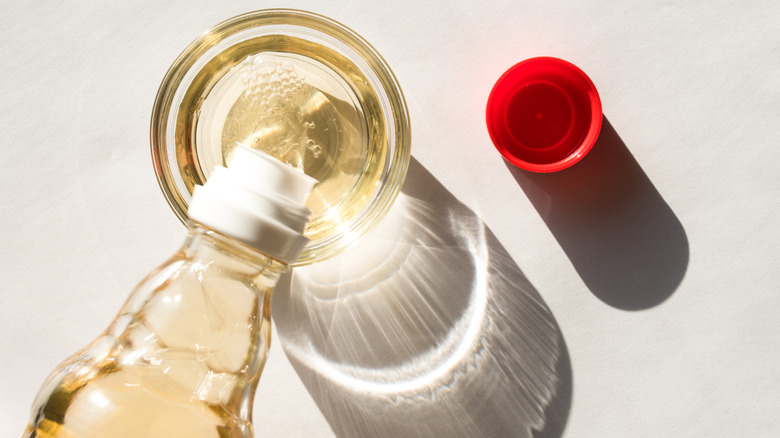The Clear Differences Between Rice Wine And Rice Wine Vinegar
Rice wine and rice wine vinegar are two ingredients frequently used in many Asian cuisines. Due to their similar names, the two are often confused for each other, but are very different. One is a wine and the other, a vinegar. While both are made by fermenting rice, clear differences of rice wine and rice wine vinegar stem from how they're made, as well as how they're used in cooking.
Typically, wines are made by fermenting fruit. With rice wine, however, it is glutinous rice that is being fermented. Yeast converts the sugars in the rice to alcohol, which is then aged and distilled into a wine valued for its sweetness. The color of rice wine can range from pale to yellow to brownish red. Common rice wines include mirin from Japan and Shaoxing wine from China. Compared to their Western equivalents, these wines generally have a higher sugar content and lower alcohol content.
Rice wine vinegar, alternatively called rice vinegar, is first made by fermenting the sugar in rice (including white, brown, and black varieties) to make alcohol. Then organisms called acetobacters are added, changing the alcohol into acetic acid, the characteristic acid in vinegar. The resulting vinegar is sweeter and lighter than white distilled vinegar. Its color can range from yellow to brownish red to even black, and variations are common throughout Vietnamese, Korean, Japanese, and Chinese cuisine.
Rice wine vinegar and rice wine have different cooking applications
Another fundamental difference between the two is that rice wine vinegar has different cooking applications than rice wine. Rice wine is typically employed to flavor vegetable dishes, dumplings, soups, marinades, and stocks. When it's used, the rice wine is usually cooked to burn off the alcohol, leaving behind a delicate sweetness.
Rice wine vinegar, on the other hand, is a source of acidity and is typically ideal for stir-frys, sauces, or vegetable pickling; it contributes a sharp, bright flavor to a vinaigrette or marinade. In Japanese cuisine, rice wine vinegar is added to seasoned sushi rice because it's not overpowering, avoiding the pitfalls of other vinegars, it seeks to balance the rice itself. Sometimes rice wine vinegar is seasoned, with additional salt or sugar augmenting the dish on a sweeter note.
Another stark difference between the two? People sometimes drink rice wines as a beverage. But no one is enjoyably sipping on acidic rice wine vinegar. While the two Asian pantry staples might share names that are confusingly similar, one should not be substituted for the other in a recipe. In a pinch, common substitutes for rice wine include a dry sherry or white wine. If you don't have rice wine vinegar, apple cider vinegar can do the trick.

